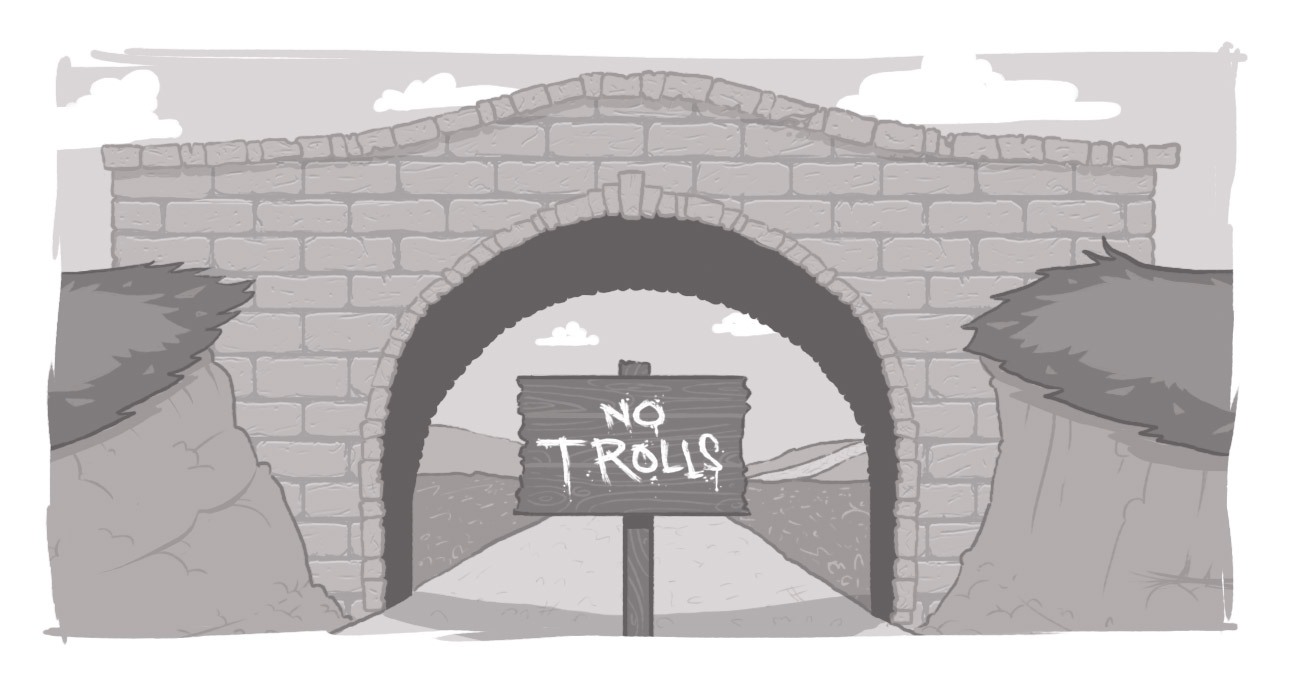Lay Down the Law to Keep the Trolls at Bay

Common courtesy is not always that common – especially when it comes to Internet discourse.
While some so-called trolls enjoy playing games with your brand, you can establish some ground rules up front that can help establish the rules of engagement and ensure that you don’t undermine your brand in your efforts to protect it.
On the Internet, there are two types of trolls:
- The “I’ve decided to call you a troll simply because you disagree with me” trolls; and
- The “loves nothing more than to post anonymously (or with a pseudonym) and say intentionally controversial/hateful/racist/misogynist/sexist/off-topic comments for a reaction” trolls.
The former, I can’t help you with because they only exist in your perception; the latter, I can give you some tips for handling.
In history and literature, there are traditionally three ways to defeat a troll: outwit them, expose them to sunshine where they’ll turn to stone; or use crosses or blessed items to ward them off (as, of course, in certain eras of Scandinavian folklore, trolls are nothing more than allegories for non-Christians).
Those same techniques have their parallel on-line:
- Outwit – most times, it’s not that challenging to outwit an Internet troll, but it’s rarely a good way to go about doing it. Getting into a battle of wits with someone interested merely in antagonism only serves to diminish your standing. Thing about the last shouting match or schoolyard argument you saw: who came out looking mature? So as tempting – and as satisfying – as it may be to engage, don’t.
- Expose them to sunshine – Many trolls – especially in forums that don’t demand identification – thrive in anonymity. Generally, it’s not hard to find out who they are, but it’s rarely worth the time. Again, you raising their virtual faces to the sunlight only reflects badly on you. No matter how justified it may be you still come across as petty.
The only technique that works is the last one: using ‘crosses’ or ‘blessed items’ to ward them off. And those totems? Your words and rules.
Consider it preventative maintenance for your social networks. By establishing a code of conduct or rules of discourse right up front, you’re clearly outlining the type of community you’re going to tolerate.
Now, the focus should only be on the delivery, not the message. You should still allow all comments, even if they’re negative. But as long as the criticism is constructive and presented appropriately, you can benefit from both the good and the bad.
However, if they violate any of your established rules, then you have the right to delete those comments (generally with an explanation, though).
Behaviours worthy of deleting include:
- Swearing;
- Personal insults;
- Threats;
- Statements that are libelous in nature (not statements you don’t like, but statements that are factually incorrect and serve to defame);
- Posting irrelevant/spam-my links; and
- Sexist, misogynist, racist, and hate comments.
Other than that, I feel all goes. Someone wants to lie about your brand or product? Then mobilize the team to reply with the truth. Somebody’s unhappy with his or her experience? Then take this opportunity to put your customer-service skills to the test and turn that negative into a positive.
Many businesses find this counterintuitive. Some are downright hostile towards the idea of posting negativity on one’s site. But a comment is only as strong as the context in which it’s framed – both good and bad.
A Facebook page that’s filled only with praise and love will undermine the benefit of any legitimate testimonials. Your readers will believe that you’re culling the negative, which only serves to call into question the validity of your positives.
And the damage done by a negative comment is far less than the benefit you can glean from addressing the situation. Deleting it only compounds the problem as nothing is really deleted from the Internet. If customers – and potential customers -- find out that you’re eliminating the negative, you may set yourself up for a worse situation (see: Applebee’s).
However – and this may seem to go against everything I’ve said in the past about honesty, openness, and accepting both good and bad commentary – honesty, openness, and providing a forum for conversation are not absolutes.
There are secrets to be kept for business and competitive purposes. We accept that. When it comes to corporate honesty, I have one adage that works for both internal and external communications: tell them everything you can and tell them what you can’t – but make sure to tell them why.
And if you’ve established the ground rules up front, it indemnifies you from charges of “censorship!” You set the rules and if certain members of your community choose not to play by them, then no one will have a problem with you kicking them out of the game.
Have you had any experience with trolls? How have you handled them? Comments are open.
Should I delete comments on my blog?
How do I deal with negative comments on my blog?
How do I deal with trolls?
What is a troll?
How do I keep my blog classy?
SUBSCRIBE TO OUR E-NEWSLETTER
 Subscribe
Subscribe


